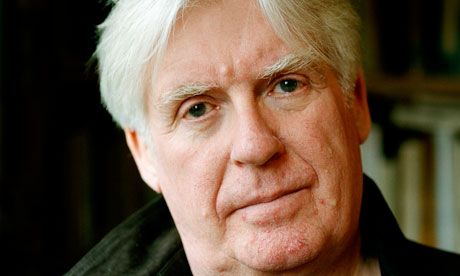
David Harsent's 10th collection can be read almost like a novel in that most of the poems belong to a continuing world. In other ways, this could not be less like a novel. It demands re-reading. The experience is like setting out on a journey at night: your eyes take time to get used to the dark. These are among the most frightening poems I have ever read. It does not come as a surprise to learn that Harsent once wrote crime fiction. But it would be misleading to say his poems are frightening in the way a thriller is. They are far more enigmatic, unburdened by plotty reassurances and free of resolutions. Harsent creates a suspense that has no ending. His poems have something in common with the novels of John Banville – especially The Book of Evidence – in that they describe a world charged with emotion, stained with shame, in which nothing is neutral and where lyricism thrives but can never absolve. As in all the worst nightmares, even the light turns out to be frightening.
The narrator has evicted himself from his former life. In the opening poem, "Rota Fortunae", he writes: "… and there floods in, now as never before, that sense/ of giving yourself over to chance/ that will turn you for home, or take you to the brink". By the last poem, the sun has taken fortune's part: "the sun going down like a broken wheel;/ and everything at my back". The poems create an unreliable landscape in which only the sea can be depended upon to be itself (and is brilliantly written about – "the sea gone white/ as if water could run under frost"; the simple beauty of that idea stops one in one's tracks). Nothing is steadfast, and the sky is prone to strange exhibitions of colour: "…do whatever you must, so long as that purple-and-yellow blush/ in the sky doesn't mean what it seems…"
There are many roads – more and less travelled. Night overwhelms day. In "The Garden Hammock" (see below), night advances with startling speed to cancel out a summer scene. All the garden poems are wonderful and strange. The houses in this landscape haunt themselves. Rain is always on the cards. And the cards, when consulted, augur badly. There are many dawns, most of them false.
The poems pursue a solitary journey in which a woman is sometimes sighted but unreachable, as if seen from another world: "A woman is laying a table; the cloth/ billows as it settles; a wine-glass catches the light." But these poems do not need personal effects, names, faces, birthmarks. Harsent has a dreamer's eye and an unerring ear. He has a gift for finding last lines that know they must be the last. "Vanitas" ends with an ostensible irresolution that turns out to be conclusive: "what happens next is anybody's guess:/ the window a mirror perhaps, the room a wilderness". One wants to speak this aloud for the pleasure of its final rhyme – the way the three syllables in wilderness extend themselves so that one can lose oneself in the word.
"Elsewhere", the long poem that ends the collection, is Harsent's most dazzling achievement. "Elsewhere" might be the title of the entire collection in that it extends the exploration of what it is to be transplanted, on the run. This poem deepens the theme of dispossession, the days and nights of reckoning, the consideration of what it might mean to lose everything. Harsent alludes to loss in so many ways but his poems are treasures – all gain.
The Garden Hammock, by David Harsent
Your book is Summer by Edith Wharton. A smell
off the borders of something becoming inedible.
Between sleeping and waking, almost nothing at all.
There's music in this, there would have to be: a swell
of strings and bells becoming inaudible,
note by note, before you latch on to it. The girl
in the story won't prosper, that's easy enough to tell.
How did night come on like that? The sky is full
of birds, wingbeats in darkness becoming indelible.

